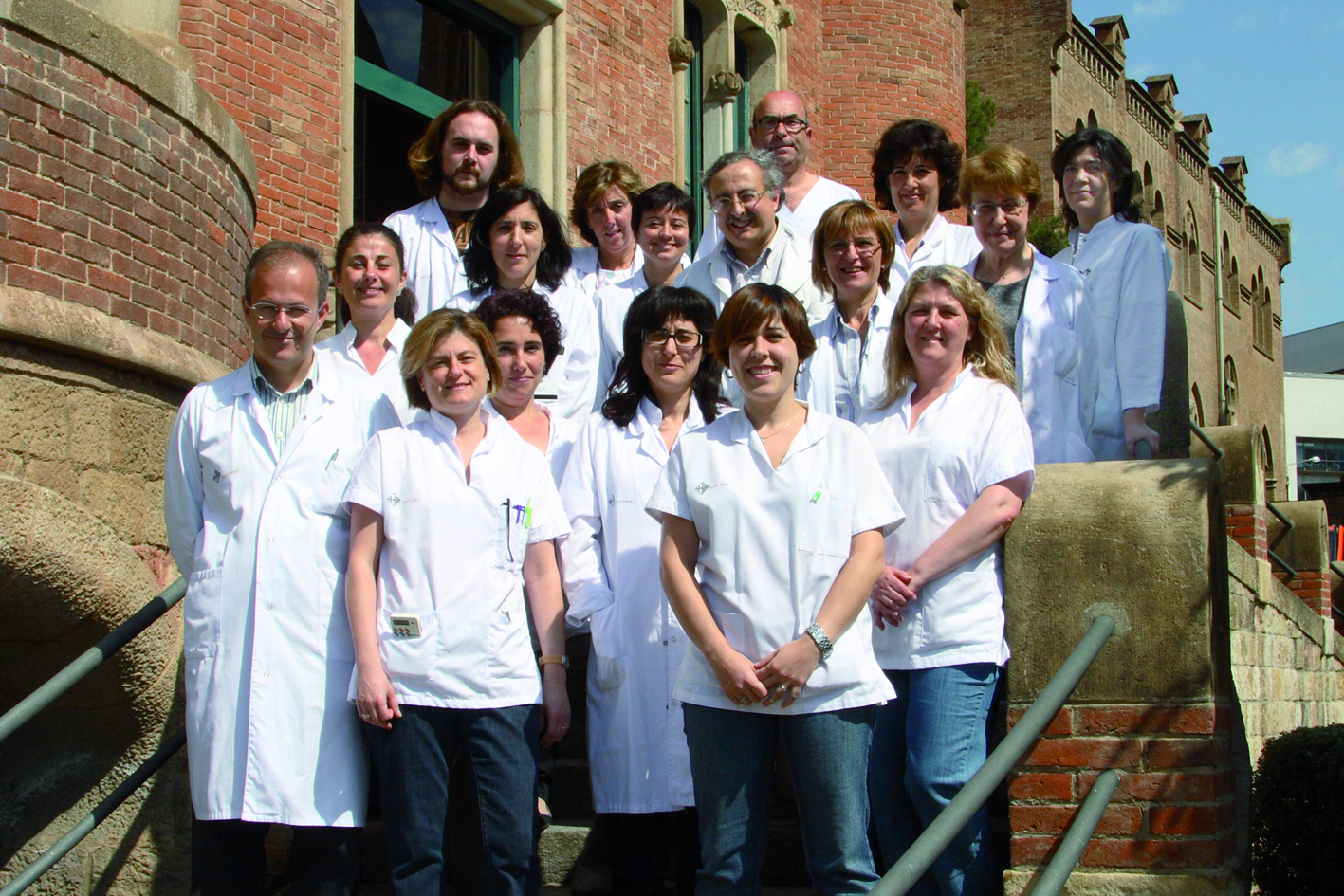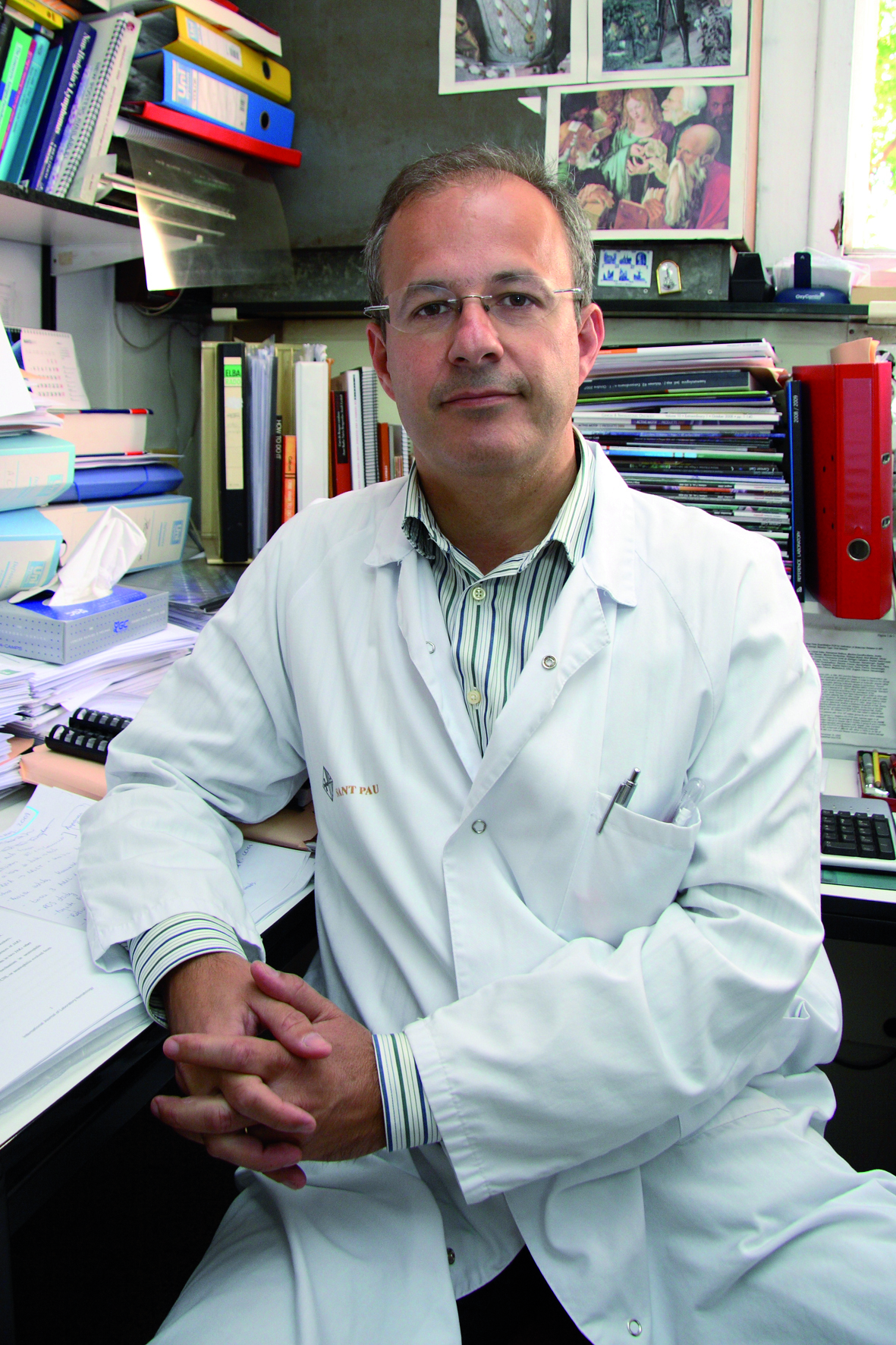


NOMDEDEU GUINOT, JOSEP FRANCESC FGS
jnomdedeu@santpau.cat
Blanco, Maria Laura FGS
Brell Martinez, Albert FGS
Bussaglia Petrillo, Elena Mart FGS
Carricondo Morcillo, Maite FGS
Espadaler Pare, Montserrat FGS
Fernandez Rosales, Maria Nieves FGS
Fuentes Hernandez, Francisca FGS
Gine Vilalta, Anna IR
Leoz Allegretti, M. del Pilar FGS
Martinez Sanchez, Elisabeth FGS
Martinez Valverde, Clara Maria FGS
Ortin Quilez, Rosa FGS
Pratcorona Canela, Marta FGS
Ramirez Moran, Dubraska Shalom FGS
Remacha Sevilla, Angel Francisco FGS
San Jose Alonso, Paula FGS
Sanchez Garcia, Jana FGS
Serra Ferrer, Marta FGS
Ubeda Rodenas, Jose FGS
(JIF 2023)
-Arguello M, Albiol N, Jara P, Garcia I, Redondo S, Esquirol A, Novelli S, Saavedra S, Martino R, Nomdedeu J, Sierra J, Mora A, Moreno C. Evolution in the frontline treatment of patients with chronic lymphocytic leukemia: experience from one European center. LEUKEMIA & LYMPHOMA. 2023; 64(10). DOI:10.1080/10428194.2023.2232489. PMID:37452739. IF:2,200 (Q3/6D). Document type: Article.
-Castillo MI, Ribate VE, Muñoz CM, Santillana SG, Taboada SE, Casterá ME, Abinzano CMJ, Barranco IA, Nieto CR, Pampliega VM, Blanco ML, de Andrés ÁS, de Oteyza PJ, del Castillo BT, Font GI, Cayuela JA, Díez M, Sánchez AR, Vercet SC, Díaz TM, Grupo Espanol de Sindromes Mielodisplasicos (Incidence and prognostic impact of U2AF1 mutations and other gene alterations in myelodysplastic neoplasms with isolated 20q deletion. Cancer Medicine. 2023; 12(16). DOI:10.1002/cam4.6300. PMID:37403747. IF:2,900 (Q2/5D). Document type: Article.
-Marin O, Romero D, Rodriguez J, Distefano M, Lessi F, Aretini P, Liquori A, Castaño J, Kozyra E, Kotmayer L, Bueno C, Cervera J, Rodriguez JC, Nomdedeu JF, Murillo L, De Heredia CD, Pérez A, López F, Martínez C, Dorado N, Marco FM, Prósper F, Menendez P, Valcárcel D, Ballestar E, Bödör C, Bigas A, Catalá A, Wlodarski MW, Giorgetti A. Epigenome profiling reveals aberrant DNA methylation signature in GATA2 deficiency. HAEMATOLOGICA. 2023; 108(9). DOI:10.3324/haematol.2022.282305. PMID:36815365. IF:8,200 (Q1/2D). Document type: Letter.
-Mosquera A, Perez M, Hernandez A, Gonzalez T, Arellano E, Martinez J, Villaverde A, Raya JM, Ayala R, Ferrer F, Fox ML, Velez P, Mora E, Xicoy B, Mata MI, Garcia M, Angona A, Cuevas B, Senin MA, Ramirez A, Ramirez MJ, Perez R, de Villambrosia SG, Martinez C, Gomez MT, Garcia C, Gasior M, Bellosillo B, Steegmann JL, Alvarez A, Hernandez JM, Hernandez JC, Spanish MPNGRP. Machine Learning Improves Risk Stratification in Myelofibrosis: An Analysis of the Spanish Registry of Myelofibrosis. Hemasphere. 2023; 7(1):e818. DOI:10.1097/HS9.0000000000000818. PMID:36570691. IF:7,600 (Q1/2D). Document type: Article.
– Mulet M, Osuna-Gómez R, Zamora C, Artesero I, Arús M, Vera-Artazcoz P, Cordón A, Vilalta N, San-José P, Abril A, Moliné A, Morán I, López-Contreras J, Vidal S. Dysregulated neutrophil extracellular traps formation in sepsis. Immunology. 2023; 170(3):374-387. DOI: 10.1111/imm.13676. PMID: 37381594. IF:4,900 (Q2/3D). Document type: Article.
-Onate G, Pratcorona M, Garrido A, Artigas A, Bataller A, Tormo M, Arnan M, Vives S, Coll R, Salamero O, Vall F, Sampol A, Garcia A, Cervera M, Avila SG, Bargay J, Ortín X, Nomdedéu JF, Esteve J, Sierra J, Spanish Cooperative Study GRP. Survival improvement of patients with FLT3 mutated acute myeloid leukemia: results from a prospective 9 years cohort. Blood Cancer Journal. 2023; 13(1):69. DOI:10.1038/s41408-023-00839-1. PMID:37147301. IF:12,900 (Q1/1D). Document type: Article.
-Orgueira AM, Encinas MMP, Varela N, Mora E, Díaz M, Montoro MJ, Pomares H, Ramos F, Tormo M, Jerez A, Nomdedeu JF, Sanchez CD, Leonor A, Cárcel P, Romero MTC, Xicoy B, Rivero E, Barreto R, Diez M, Benlloch LE, Crucitti D, Valcárcel D. Machine Learning Improves Risk Stratification in Myelodysplastic Neoplasms: An Analysis of the Spanish Group of Myelodysplastic Syndromes. Hemasphere. 2023; 7(10):e961. DOI:10.1097/HS9.0000000000000961. PMID:37841754. IF:7,600 (Q1/2D). Document type: Article.
(JIF 2022)